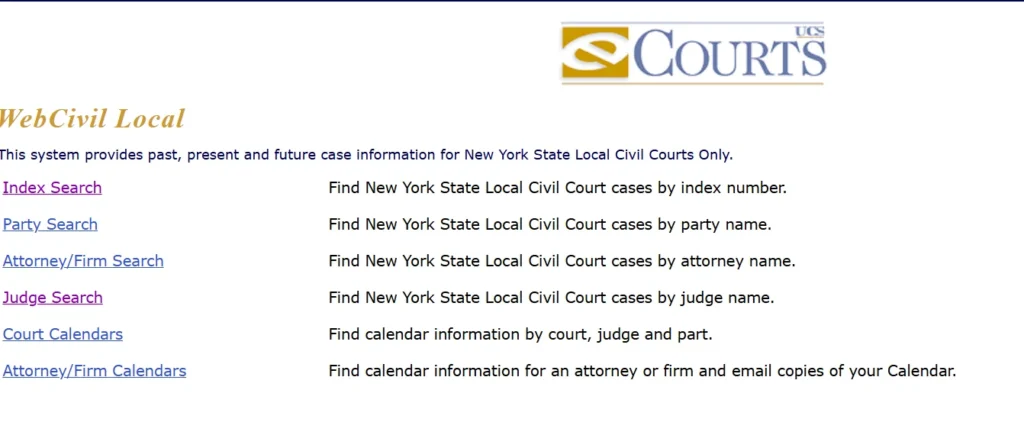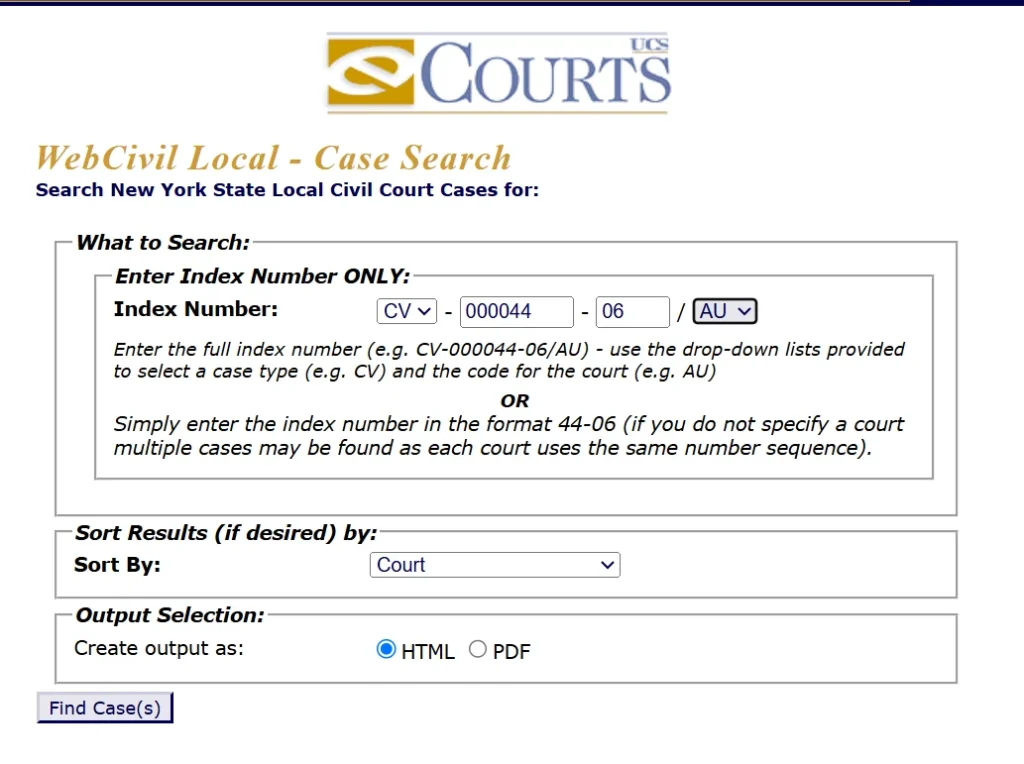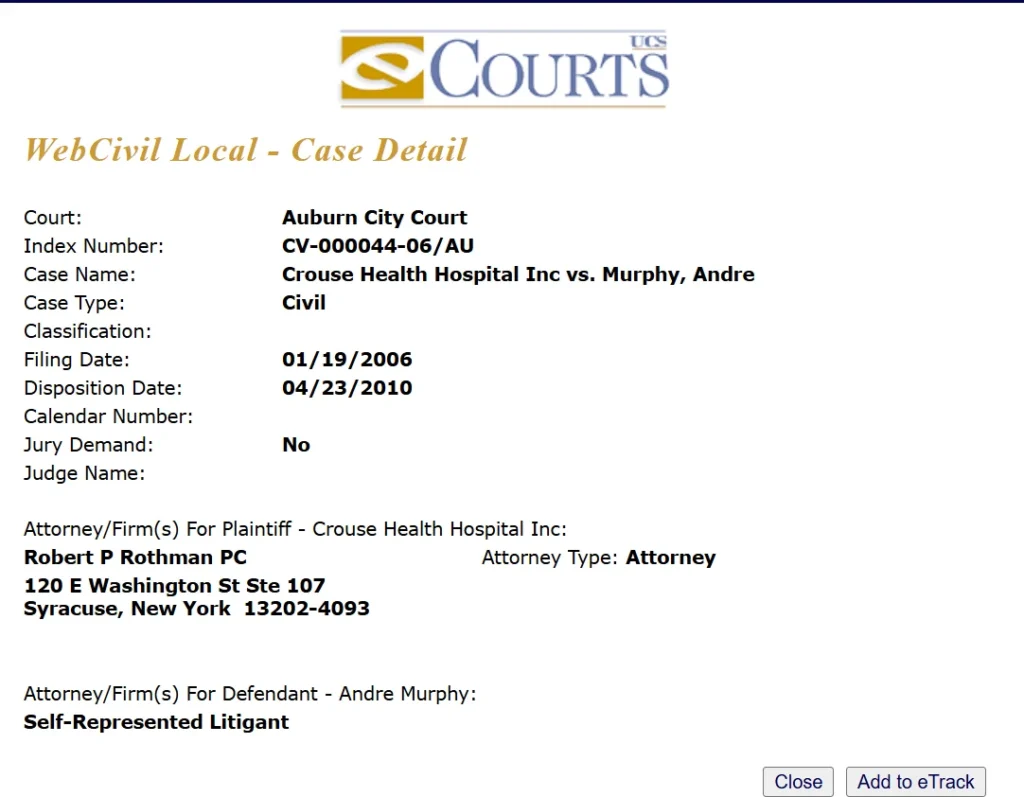Webcivil Local
Navigating the complexities of the legal system can feel daunting. However, in New York State, the WebCivil Local platform stands as a beacon of accessibility, offering a direct digital gateway into the daily operations of local civil courts across the state.
As a core component of the broader New York State eCourts initiative, WebCivil Local transforms how individuals, legal professionals, and the public access crucial case information.
Whether you’re tracking a live civil dispute or reviewing the outcome of a concluded matter, WebCivil Local offers invaluable insights, demystifying the legal process and fostering greater transparency.
This includes cases from 61 City Courts, and the District Courts in Nassau and Suffolk Counties, along with the New York City Civil Courts. You can easily look for cases using:
Table of Contents
Why WebCivil Local is an Indispensable Resource
WebCivil Local isn’t just a tool; it’s a vital public service benefiting a diverse range of users:
- For Litigants: If you’re directly involved in a civil case, this platform empowers you to diligently monitor its progression, review associated court documents (where available), and stay informed about all scheduled court appearances. It puts you in control of your case’s journey.
- For Legal Professionals: Lawyers and their teams find WebCivil Local an indispensable resource for efficient legal research, quick case status checks, and gathering critical information pertinent to local civil matters. It streamlines daily practice and enhances preparedness.
- For Landlords and Tenants: In disputes often handled by these courts, WebCivil Local offers valuable insights into legal rights and obligations, helping both parties better understand the civil framework governing their agreements and conflicts.
- For the Public: Beyond specific case involvement, the general public gains unprecedented transparency into the operational mechanics of the local civil justice system. This fosters a more informed citizenry and strengthens public trust in judicial processes.
By providing easy online access to vital court information, WebCivil Local doesn’t just store data; it actively helps to make the legal system more understandable and approachable for anyone with an internet connection, breaking down traditional informational barriers.
Exploring WebCivil Local’s Powerful Search Capabilities
WebCivil Local is designed with user-friendly search functions, helping you quickly pinpoint the information you need. Here’s how you can navigate its extensive database:
- Index Number Search: For the most precise results, use this if you have the exact case index number, the unique identifier assigned to each court case.
- Party Name Search: You can locate relevant cases by entering the full name of either the plaintiff (the party initiating the lawsuit) or the defendant (the party being sued).
- Attorney/Firm Search: If you know the legal representative involved, search for cases associated with a specific attorney or law firm. This is great for researching an attorney’s caseload or past cases.
- Judge Search: Discover cases presided over by a particular judge in a local civil court, useful for understanding a judge’s specific rulings or typical caseload.
- Court Calendars: This powerful feature lets you view the daily schedule for an entire court, a specific judge, or even a particular ‘part’ (a specialized division within a court). You can easily see which cases are slated for a given day and time.
- Attorney/Firm Calendars: Attorneys and law firms can leverage this function to access their own court schedules and even sign up for email notifications regarding any changes or updates to their appearances.

Understanding New York’s Local Civil Courts
Often considered the bedrock of New York’s judicial system, local civil courts manage a broad spectrum of everyday legal disputes. These courts are strategically located throughout the state, ensuring accessibility for residents in both bustling urban centers and quiet rural communities.
Jurisdiction and Case Types
Local civil courts handle a diverse range of civil matters, addressing common disagreements that impact daily life:
- Small Claims: These courts resolve disputes where the monetary value is relatively modest, typically capped at $5,000 for individuals and $10,000 for businesses. Common examples include outstanding debts, minor property damage, and consumer grievances.
- Landlord-Tenant Disputes: These crucial cases involve disagreements between property owners and renters concerning issues such as overdue rent, breaches of lease agreements, and eviction proceedings.
- Commercial Small Claims: Businesses can use this forum to resolve financial disputes involving smaller sums, frequently related to contracts, services rendered, or goods exchanged.
Geographic Reach and Court Structure
Local civil courts are present in every county and most cities throughout New York State. Each court serves a defined geographical area, meaning the appropriate court location depends on where the dispute originated or where the involved parties reside. A comprehensive directory of these courts is available on the official New York State Courts website.
Every local civil court is overseen by one or more judges who preside over cases and render decisions. Court clerks manage administrative duties, while court officers maintain order within the courtroom. Some courts may also feature specialized divisions, such as dedicated housing courts or small claims courts, to handle specific types of cases more efficiently.
A clear understanding of the function and organization of local civil courts is paramount for anyone who might interact with them. Knowing where to initiate a case and the types of matters these courts address empowers individuals and businesses to navigate the legal system more effectively.
Navigating WebCivil Local
WebCivil Local is designed for intuitive use, even for those new to legal research. Here’s a simple guide to maximize your experience:

- Access the New York Courts Website: Start by visiting the official website of the New York State Unified Court System (NYCourts.gov).
- Locate WebCivil Local: On the homepage, find the “e-COURTS” section. Clicking this will lead you to a subsequent page where you’ll find the specific link for “WebCivil Local.” Click to proceed.
- Conduct Your Search: You’ll be presented with various search options. Choose the method most suitable for your needs:
- Case Index Number: The most precise method if you have the unique number.
- Party Name: Enter the full name of either the plaintiff or the defendant.
- Attorney Name: Search using the name of the attorney.
- Review Search Results: The system will display a list of cases matching your criteria. Click on the desired case to view its details.
- Examine Case Information: Once a case is selected, you can access a wealth of data, including:
- Case Summary: A concise overview of parties, classification, filing date, and court.
- Case History Timeline: A chronological record of the case’s progression, detailing key events like appearances, document filings, and judicial decisions.
- Accessing Court Documents: Depending on the case and court rules, you may be able to view certain filed documents, such as initial complaints, motions, and final decisions.
- Optional: Sign up for eTrack Notifications: For ongoing updates, register for eTrack. This complimentary service sends email alerts whenever there’s new activity or a significant change in the case, such as a new filing or an updated court date.

Effective Usage Tips:
- Patience is Key: Allow some time for newly entered case information to become available online.
- Vary Your Search Terms: If you’re unsure of exact spellings or numbers, try different variations or partial information.
- Cross-Verify Information: While WebCivil Local is an excellent resource, always confirm crucial information with official court records for absolute accuracy.
Interpreting Information on WebCivil Local
While WebCivil Local makes court data readily accessible, understanding the legal terminology and case specifics can be challenging. Here’s how to interpret the information effectively:
Understanding Case Statuses:
Case statuses denote the current stage of a legal proceeding. Common terms you might encounter include:
- Active: The case is ongoing, with legal proceedings actively progressing.
- Disposed: The case has reached its conclusion, either through a settlement, dismissal, or a court’s final decision.
- Pending: The case is awaiting a judicial decision or further action from the court.
- Adjourned: The case has been temporarily postponed or rescheduled.
If you are uncertain about a particular status, refer to the New York Courts website or seek advice from a legal professional.
Deciphering Legal Terminology:
Court documents and case details often contain legal terms and abbreviations unfamiliar to non-lawyers. Here are a few common ones:
- Plaintiff: The individual or entity who initiates the lawsuit.
- Defendant: The individual or entity against whom the lawsuit is filed.
- Motion: A formal request made to the court by one of the parties involved.
- Order: A written directive issued by the court.
- Judgment: The court’s final ruling or decision in a case.
- Disposition: The final outcome of the case (e.g., dismissed, settled, judgment for plaintiff/defendant).
Should you encounter unfamiliar terms, legal dictionaries or reputable online legal resources can often provide clear definitions.
Tips for Effective Research:
To maximize your utility of WebCivil Local, consider these research strategies:
- Refine Search Queries: Use highly specific search terms, such as a party’s full name or the precise case index number, to narrow down your results.
- Utilize Date Ranges: If you’re searching for cases within a specific timeframe, employ the date range filter to refine your search.
- Consult Multiple Sources: WebCivil Local is an excellent starting point, but it may not contain every piece of information you require. Cross-reference data with other official sources, such as the main New York State Courts website or direct court records, for a comprehensive overview.
Limitations of WebCivil Local
While incredibly valuable, it’s crucial to acknowledge the limitations of WebCivil Local:
- Not All Cases or Documents Are Available: Due to privacy concerns (e.g., cases involving minors, confidential matters) or technical constraints, not every local civil court case or associated document may be accessible online. Certain types of documents may also be excluded from public viewing.
- Timeliness of Information: Although consistent efforts are made to keep information current, there can be inherent delays in updating case details and documents. Data you retrieve may not always reflect the absolute latest developments in real-time.
- The Importance of Information Verification: Given these limitations, it is paramount to verify any critical information obtained from WebCivil Local with official court records. For the most precise and up-to-the-minute details, directly contact the clerk’s office of the relevant local civil court.
Remember, WebCivil Local is a highly beneficial tool for initial research and accessing fundamental case information, but it should not be considered a substitute for official, certified court records.
Additional Legal Resources in New York
While WebCivil Local is powerful, it’s not the sole tool to assist you in navigating the complexities of the New York legal system. Here are other valuable resources:
- New York State Courts Website: The official website of the New York State Unified Court System (NYCourts.gov) offers a wealth of information beyond WebCivil Local:
- Other eCourts Features: Explore additional functionalities like e-Filing (if you’re eligible) and court calendars for all levels of courts.
- Court Directories: Find comprehensive contact information for specific courts, including addresses, phone numbers, and hours.
- Legal Resources: Access a variety of legal forms, self-help guides, and informational materials on diverse legal topics.
- Legal Aid Organizations: If you’re involved in a civil case and have limited income, you may qualify for free or low-cost legal assistance. These organizations provide legal representation and advice to those who cannot afford private counsel.
- Bar Associations: Both local and state bar associations offer public resources, including valuable lawyer referral services. If you need to retain an attorney for a civil case, a bar association can help you find a qualified professional specializing in the relevant area of law.
Navigating the legal system can be intricate, but you don’t have to face it alone. Leverage these additional resources to obtain the support and information you require.
Conclusion
WebCivil Local stands as a transformative tool, effectively opening the doors to local civil courts across New York State. By providing straightforward access to case information, it empowers individuals, legal professionals, and the general public with crucial insights into the legal process. While it’s essential to be mindful of its inherent limitations and to cross-verify information with official sources, WebCivil Local remains an invaluable asset for anyone seeking data related to local civil cases.
As a potent symbol of transparency and accessibility, WebCivil Local emphatically underscores the New York State Unified Court System’s unwavering commitment to making the legal process more comprehensible and accessible to everyone. By utilizing this tool responsibly and ethically, we can collectively contribute to a more informed and engaged citizenry.
FAQ
Can I use WebCivil Local to determine if my neighbor has been sued?
Yes, if your neighbor has been involved in a local civil court case in New York, you may be able to find information about that case on WebCivil Local. You can typically search by their name or by the address of any property involved. However, remember that not all cases are available online, and some information may be restricted due to privacy.
I’m being sued in small claims court. Can WebCivil Local help me prepare for my case?
Absolutely. WebCivil Local can be very helpful for preparing for your small claims case. You can use it to:
- Review court documents: Access the complaint filed against you and any other documents submitted by the opposing party.
- Track case status: Check the current standing of your case and see if any court dates have been scheduled.
- Research similar cases: Look for other small claims cases involving similar issues to understand how judges might rule in your situation. However, it’s crucial to understand that WebCivil Local does not provide legal advice. If you require legal assistance, it is best to consult with an attorney.
Can I use WebCivil Local to file a complaint against my landlord?
No, you cannot directly file a complaint through WebCivil Local. It’s an information portal. However, it can be instrumental in researching your rights as a tenant and gaining a better understanding of the legal process. You can also use it to find information about other landlord-tenant disputes that may be similar to your own. To formally file a complaint, you will need to go through the proper channels, which typically involves contacting your local housing court or a legal aid organization.
Is WebCivil Local accessible on my smartphone?
Yes, WebCivil Local is designed with mobile-friendliness in mind, allowing you to easily access it on your smartphone or tablet. This provides the convenience of checking case information while on the go.
Is WebCivil Local the same as eCourts?
No, WebCivil Local is a specific feature or component within the broader eCourts platform. While eCourts encompasses various online services for different courts across New York, WebCivil Local is specifically dedicated to providing information on local civil court cases.